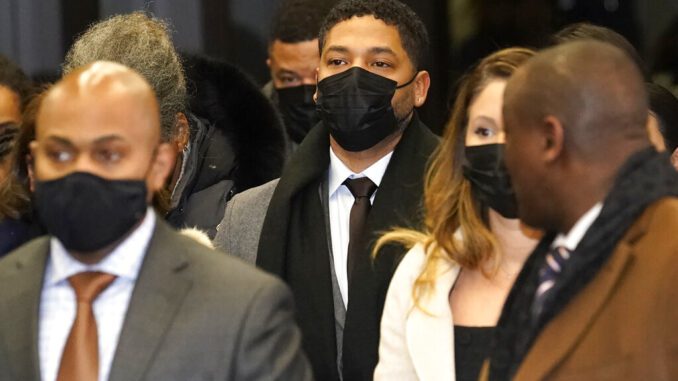
Last week, we learned the fate of former “Empire” actor Jussie Smollett, who was  charged with six counts of felony disorderly conduct for lying to the police and detectives.
charged with six counts of felony disorderly conduct for lying to the police and detectives.
The charges stemmed from what he said was an attack that happened in Chicago in the wee hours of the morning on Jan. 29, 2019, where he alleged that two men in pro-Donald Trump “MAGA” hats assaulted him and yelled racist and homophobic slurs.
The so-called “attack” turned out to be a hate-crime hoax staged by the actor himself with the two “attackers” being brothers Abel and Ola Osundairo, who were extras from the “Empire” set.
After listening to both sides make their respective cases, the jury found Smollett guilty on five of the six charges.
Though the saga isn’t over — the city of Chicago is still in the midst of a lawsuit against Smollett for the time spent on the investigation, and the Osundairo brothers also have a pending lawsuit against the actor and his legal team — now is as good a time as any to discuss the big lesson that should be learned from this case.
After the media got word of the alleged attack back in January 2019, the ink wasn’t even dry on the papers the story was printed on before opportunistic politicians, celebrities, media types, and other prominent public figures weighed in with outrage over the reports.
None of them bothered to wait for the investigation to play out before rushing to Smollett’s defense, with some also taking the opportunity to smear all Trump supporters as harboring the same racist and homophobic tendencies as Smollett’s alleged attackers.
Then-Sen. Kamala Harris, who had just declared her candidacy for president a week prior, weighed in by tweeting that Smollett “is one of the kindest, most gentle human beings I know. I’m praying for his quick recovery.”
“This was an attempted modern-day lynching,” she continued. “No one should have to fear for their life because of their sexuality or color of their skin. We must confront this hate.”
Joe Biden, who was three months away from throwing his hat in the ring, was also quick to share his thoughts on what had allegedly happened to Smollett.
“What happened today to Jussie Smollett must never be tolerated in this country,” his tweet read. “We must stand up and demand that we no longer give this hate safe harbor; that homophobia and racism have no place on our streets or in our hearts. We are with you, Jussie.”
Robin Roberts of “Good Morning America” gave a very sympathetic interview to Smollett, treating the story of his alleged attack as though it was true, although skepticism at the time was widespread and police and investigators already suspected Smollett had lied to them.
Many other media outlets treated the story as factual as well without using the standard qualifiers like “alleged” and “he said happened,” etc.
Anyone who expressed doubt over Smollett’s story was also lumped in with his supposed attackers. You were either with Jussie Smollett or you were okay with hate crimes being committed and going unpunished.
Smollett’s case wasn’t just an indictment of the once-beloved actor but also an indictment of the tendency many people have to rush to judgment before waiting for more information. Though this tendency isn’t restricted to the left and the media, when it comes to stories like this, generally they are the first ones out of the gate to be quick on the draw.
It happened with Smollett and it also happened in the Kyle Rittenhouse case out of Wisconsin, which I wrote about in a prior column.
The lesson to be learned? Wait for the facts. How hard can it be, really? As it turns out, very hard for people with political axes to grind.
Media analyst Stacey Matthews has also written under the pseudonym Sister Toldjah and is a regular contributor to RedState and Legal Insurrection.

